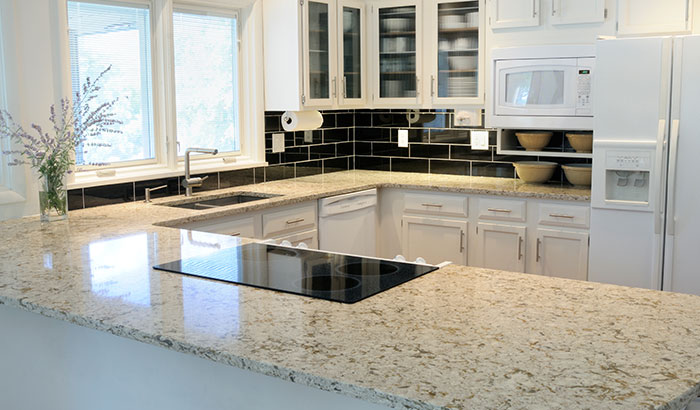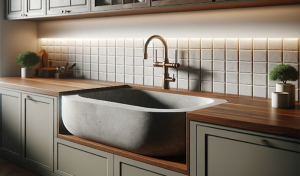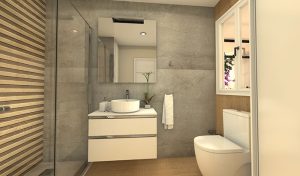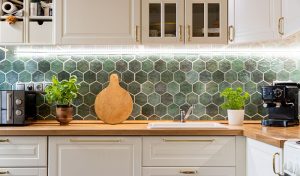So you’re considering putting granite countertops in your kitchen but need more information to help you decide? Well, this article will help. First, we will explore what granite is and then will share with you the top 20 pros and cons of choosing granite for your kitchen countertops.
What Is a Granite Countertop?
A granite countertop is a type of countertop surface made from natural granite, a coarse-grained igneous rock composed mainly of quartz, feldspar, and mica. It is one of the most popular materials used for kitchen and bathroom countertops due to its durability, aesthetics, and heat resistance.
Granite countertops are created by cutting granite slabs into specific dimensions and then polishing the surface to achieve a smooth and glossy finish. The slabs used for kitchen countertops are typically several centimeters thick and can be custom-cut to fit the dimensions of the kitchen or bathroom.
Granite offers several advantages as a countertop material. It is highly resistant to scratches, stains, and heat, making it suitable for busy kitchens. It also provides a luxurious and natural appearance, with a wide range of colors and patterns due to the rock’s natural variations.
To maintain the beauty and longevity of granite countertops, it is important to clean them regularly with mild soap and water and avoid using abrasive cleaners that could damage the surface. It is also recommended to seal the granite periodically to enhance its resistance to stains and moisture.
Overall, granite kitchen countertops are prized for their durability, aesthetic appeal, and the unique beauty they bring to a kitchen or bathroom space.
Now, let’s take a closer look at the pros and cons of granite countertops:
Pros:
- Durability: Granite is an extremely durable material, resistant to scratches, chips, and general wear and tear, ensuring that your countertops will maintain their beauty and functionality for years.
- Heat Resistance: Granite can withstand high temperatures, making it an excellent choice for placing hot pots and pans directly on the surface without causing any damage or discoloration.
- Aesthetics: Granite countertops offer a natural and luxurious appearance with unique patterns, colors, and veining, adding a touch of elegance and sophistication to any kitchen or bathroom.
- Longevity: With proper care and maintenance, granite countertops have an exceptionally long lifespan, often lasting for several decades, making them a worthwhile investment in your home.
- Resale Value: Granite countertops are highly desirable and sought after by homebuyers. Installing granite can significantly increase the resale value of your home due to its durability, timeless appeal, and luxurious reputation.
- Hygiene: Granite is non-porous when properly sealed, meaning it doesn’t absorb liquids and is resistant to bacteria and stains. This makes granite countertops a hygienic surface for food preparation and reduces the risk of cross-contamination.
- Easy Maintenance: Granite kitchen countertops require minimal maintenance. Regular cleaning with mild soap and water is usually sufficient to keep them clean and looking their best. Additionally, granite is naturally resistant to mold and mildew.
- Versatility: Granite can be custom-cut to fit any kitchen or bathroom design, offering flexibility in shape, size, and edge profiles. This allows you to create unique, personalized countertops that perfectly complement your space.
- Unique Patterns: One of the most appealing aspects of granite is its individuality. Each granite slab is unique, with its distinct patterns, colors, and veining, ensuring that your countertop will be one-of-a-kind and unlike any other.
- Natural Material: Granite is an environmentally friendly choice as it is a natural stone that is quarried and not manufactured. It does not release harmful chemicals or emit VOCs, promoting a healthier indoor environment.
- Resistant to Chemicals: Granite is generally resistant to household chemicals, such as cleaning agents and acidic liquids, reducing the risk of damage or staining from spills or accidents.
- Low Maintenance Sealing: While granite countertops should be sealed periodically to maintain their resistance to stains and moisture, the process is relatively simple and can be done by homeowners. Sealants are readily available, and application instructions are easy to follow.
- Adds Value to the Home: Granite countertops are often seen as a luxury feature and are highly desirable among homeowners. Installing granite can significantly enhance the overall value and appeal of your home.
- Smooth Surface: Granite countertops have a smooth and polished surface, making them easy to clean and maintain. The polished finish also adds to their aesthetic appeal.
- Suitable for Outdoor Use: Granite’s durability and resistance to weather conditions make it a popular choice for outdoor kitchens or barbecues, allowing you to extend the beauty and functionality of granite countertops to your outdoor living spaces.
- Impact Resistance: Granite is highly resistant to impact and can withstand heavy objects being dropped on its surface, reducing the risk of damage compared to other countertop materials.
- Scratch Resistance: Granite is one of the hardest natural stones available, which makes it highly resistant to scratches from everyday use, such as cutting food or placing utensils on the surface.
- Water Resistance: When properly sealed, granite is resistant to water absorption, reducing the likelihood of stains or damage from water exposure in areas such as the kitchen or bathroom.
- UV Stability: Granite is resistant to fading or discoloration when exposed to sunlight or UV rays, making it suitable for areas with ample natural light, such as near windows or skylights.
- Enhances Other Design Elements: Granite kitchen countertops can complement and enhance other design elements in your kitchen or bathroom, such as cabinetry, backsplashes, and flooring, creating a cohesive and visually appealing space.
Cons:
- High Pricing: Granite countertops can be relatively expensive compared to other materials, especially if you choose rare or exotic varieties. The cost includes the price of the slab, fabrication, and installation.
- Heavy Weight: Granite is a dense and heavy material requiring proper installation and structural support to bear the weight. Additional reinforcement may be necessary for cabinets or base structures, increasing the overall cost.
- Susceptible to Cracks: While granite is durable, it is not indestructible. It can crack under extreme force or if subjected to heavy impacts, such as dropping a heavy object onto the surface.
- Requires Sealing: Granite countertops must be sealed periodically to maintain their resistance to stains and moisture. If not properly sealed or maintained, granite can be susceptible to stains, especially from acidic substances.
- Limited Availability: Some unique or exotic granite varieties may be harder to find, limiting your options if you have specific preferences for colors or patterns.
- Susceptible to Etching: Certain acidic substances, such as citrus juices or vinegar, can etch the surface of granite if not promptly cleaned. Etching appears as dull spots or marks on the surface and may require professional polishing to restore the shine.
- Cold Surface: Granite can feel cold to the touch, especially in colder climates or during winter months. This may be uncomfortable for some individuals, particularly when leaning on or placing bare skin on the countertop.
- Limited Color Consistency: Due to the natural variations in granite, achieving a consistent color or pattern across larger countertop areas can be challenging. This can result in visible differences between adjacent slabs or sections.
- Potential for Staining: If spills are not promptly cleaned, certain substances like wine, oils, or acidic liquids can stain the surface of unsealed or poorly sealed granite. This is why regular sealing and maintenance are essential.
- Professional Installation Required: Due to the weight and complexity of installation, professional help is often required. This adds to the overall cost of installing granite countertops.
- Brittle Edges: The edges of granite countertops can be more susceptible to chipping or damage than the main surface. Care must be taken to avoid impacts or accidents leading to edge damage.
- Maintenance of Seams: If multiple granite slabs are required for a larger countertop, the seams between the slabs may require maintenance and care to prevent dirt or moisture buildup. Proper sealing and regular cleaning are essential for seamless integration.
- Limited DIY Repairs: While minor scratches or chips can sometimes be repaired using DIY kits, more extensive damage to granite countertops usually requires professional assistance for proper restoration.
- Weight Limitations on Cabinetry: The weight of granite countertops may necessitate reinforcing or upgrading the cabinetry underneath to provide adequate support. This can add to the overall cost and complexity of installation.
- Environmental Impact: While granite is a natural stone, the process of quarrying, processing, and transporting granite slabs has an environmental impact. Energy consumption, emissions, and waste generated during production should be considered when evaluating the sustainability of granite countertops.
- High Initial Cost: Purchasing and installing granite countertops can be a significant investment, especially when compared to alternative countertop materials. This may not be suitable for individuals on a tight budget.
- Requires Professional Cutting and Installation: Granite is a hard material that requires specialized tools and expertise for cutting and installation. This limits DIY options and may require hiring professionals, adding to the overall cost.
- Limited Availability of Consistent Patterns: While the unique patterns of granite are often a desirable feature, achieving a consistent look across larger countertop areas or multiple installations can be challenging. This may be a concern for those seeking a uniform appearance.
- Prone to Oil and Water Spots: Unsealed or poorly sealed granite countertops can be susceptible to oil and water spots. These spots can be difficult to remove and may require professional cleaning or polishing.
- Requires Regular Maintenance: Although granite countertops are generally low maintenance, they need regular cleaning and periodic sealing to maintain their appearance and performance. Failing to do so may result in staining, etching, or other damage.
Now that you know the pros and cons of having granite countertops, perhaps deciding whether to install them in your home has become a little bit easier. If you choose to add a touch of granite to your interior aesthetics, the next step is to hire a professional to install them.
Why, you may ask?
Here are the top reasons why you should leave granite countertop installations to a professional:
- Expertise and Skill: Professional installers have specialized knowledge and skill in working with granite countertops. They understand the intricacies of handling and installing granite, ensuring a precise and professional outcome.
- Quality Workmanship: Professional installers have experience working with different types of granite and have the tools and techniques to deliver high-quality work. They can ensure that your countertops are installed flawlessly, with proper alignment, seamless seams, and a smooth finish.
- Time and Efficiency: Professional installers have the expertise and experience to complete the installation efficiently. They follow a streamlined process, minimizing any disruptions to your daily routine. You can enjoy your new countertops sooner by letting professionals handle the installation.
- Structural Integrity: Granite countertops are heavy, and proper installation requires ensuring structural integrity. Professional installers have the knowledge to assess the underlying structure, provide adequate support, and securely install the countertops. This ensures the longevity and stability of your countertops.
- Safety: Installing granite countertops can involve heavy lifting and precise maneuvering. Professionals are trained in proper lifting techniques and follow safety protocols to prevent accidents or injuries during installation. Hiring professionals minimizes the risk of accidents and ensures a safe installation.
- Warranty and Assurance: Reputable professional installers often provide warranties or guarantees on their workmanship. This gives you peace of mind, knowing that any issues related to the installation will be addressed promptly and professionally. You can rely on their expertise and support to resolve any concerns.
- Value Enhancement: Professionally installed granite countertops can significantly enhance the value and appeal of your home. They are often considered a premium feature, and a well-executed installation adds to your kitchen or bathroom’s overall aesthetic and functionality. When selling your home, professionally installed granite countertops can be a compelling selling point.
By letting professionals install your granite countertops, you benefit from their expertise, quality workmanship, efficiency, structural integrity, safety, warranty, and the added value they bring to your home. This ensures a beautiful and long-lasting installation that you can enjoy for years to come.
Are you ready to enjoy the beauty and luxury that granite counters can bring to your home? Mountain States Kitchen and Bath is here to help every step of the way.
We specialize in remodeling kitchens and bathrooms across the Wasatch Front, from Spanish Fork to Salt Lake City, Utah, and everywhere in between. Contact Mountain States today to learn more about what we have to offer, or swing by our showroom in Lehi, Utah, and see some of our beautiful options and designs for yourself.
We’ll be happy to answer any questions or schedule an in-home consultation with you. Let us help you design the home of your dreams. We can’t wait to work with you!










